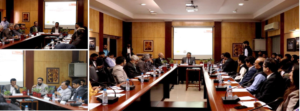The Policy Times, in association with the Centre for West Asian Studies, Jamia Millia Islamia (JMI) University, successfully organised a seminar on “Exploring Economic Opportunities in West Asia” on Wednesday, 14 November 2018 in JMI, New Delhi.
The seminar was organised to enlighten the students, research scholars, and academia a better understanding of economic opportunities in West Asia and to promote “Industry- Academia exchange”. One day event was aimed at to make people understand about India’s civilizational connection and contributions to Arab World, employment and business opportunities in West Asia in the process of wealth creation.
West Asian, a region with vast resources and vibrant cultures, has been the world business destination, especially for Indians. West Asian nations have the honor of having the maximum number of Indian expatriates. According to an estimate, somewhere around 8.5 million Indian works in Arab world generating a huge amount of remittances for India.

Key Speakers:
Mr. ATM Rokebul Haque, Deputy High Commissioner of Bangladesh to India
H.E. Mr. Jamel Boujdaria, Deputy Chief of Mission, Embassy of Tunisia to India
Mr. AP Siddiqui (IPS), Registrar, Jamia Millia Islamia
Prof. Dr. Mushtaq Shakir Al Shibani, Cultural counselor, Embassy of Iraq to India
H. E. Mr. Jamel Boujdaria, Deputy Chief of Mission, Embassy of Tunisia to India said, “Tunisia is working to strengthen bilateral relations between India and Tunisia in some priority sectors including trade, investment promotion, agriculture, export & Import, infrastructure, research, innovation, security, cyber security, energy, renewable energy, pharmaceutical and health.”
New age of economic diversification The Gulf Cooperation Council (GCC) countries share specific structural economic features as they depend heavily on hydrocarbon sector that could be seen in key macroeconomic indicators. Hence, economic diversification will be essential for Arab World because of limited natural resources. Thereby, current economic policies of GCC countries have been set to shift their economies away from heavy dependence on hydrocarbons towards more diversified economic system where the private sector becomes the engine of growth.









